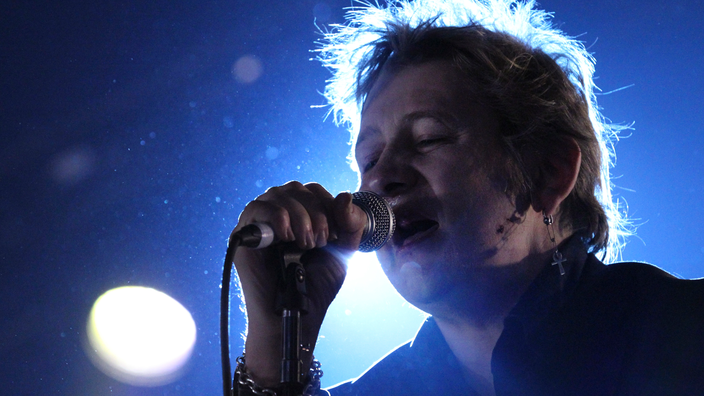Over thirty years that British pubs have been singing the words of the Christmas
hit Fairytale of New York
in unison
.
Released on the
1988
album
If I Should Fall from Grace with God
, this song by toothless Pogues frontman Shane MacGowan, duet with singer Kirsty MacColl, tells the story of a drifting couple formed on December 24 .
"
Merry Christmas my ass, I took God this is the last,"
regrets Shane MacGowan in one of the verses.
The quintessential anti-Christmas song, far from the good feelings of
Jingles Bells
,
Fairytale Of New York
has since been one of the UK's most broadcast titles in December.
And yet the BBC's premier radio station announced its decision to censor some of his lyrics.
In the line of sight, two words: the insult "
slut
" (bitch) and
"fagot"
("
fagot
").
The first, considered too “
offensive
” and replaced by a beep.
The second, "
homophobic
", replaced during the editing by the word
"haggard"
(which could be translated by "
ravaged
"), that the singer Kirsty Mccoll had pronounced during a performance recorded in 1992. To defend herself from this new version , the BBC said in a statement: “
We know this song is considered a Christmas classic, and we will continue to broadcast it this year.
(...) Our radio station has younger than average listeners.
They might be offended by bad language, especially during the holidays.
But this choice is not unanimous.
"This makes it a falsified, compromised, tamed and sterilized version, which can no longer be considered a great song"
Nick cave
An overly watered-down version
Australian singer Nick Cave, friend and collaborator of the Pogues, does not mince words to express his discontent.
On his
Red Hand Files
site
, he accuses the radio station of having mutilated
“the greatest Christmas song ever written
”.
And for good reason, substituting one epithet for another, according to him, generates dramatic consequences.
“
This makes it a falsified, compromised, tamed and sterilized version that can no longer be called a great song,
” he added.
Already in 2007, the BBC had deleted the title a few weeks, due to numerous complaints filed.
According to the Belgian daily
De Morgen
,
the radio station received some 866 complaints in 2019. However, for Shane MacGowan, the meaning of words is important.
“
In the songs, all the characters and the stories are not angels, and do not have to be necessarily decent and respectable
, he explained in 2018 to the Irish program
The
Tonight Show
.
Sometimes it is also useful that there are bad guys, so that the story told is effective.
"
“In songs, not all characters have to be decent and respectable.
The bad guys are useful to the story being told ”
Shane MacGowan
So, at the announcement of this new censorship, the singer, somewhat bored, simply assessed
this situation as
"
ridiculous
" in an interview given to the New Zealand magazine
Metro
.
On the other side, his defender Nick Cave was content to add:
“I am not in a position to judge how the word 'fagot' can offend.
But then the BBC should have made the decision to ban the song, in order to allow it to retain its outlaw spirit and dignity. ”
Bet won
According to legend,
Fairytale of New Yor
k was born out of a bet.
The one launched by Elvis Costello, producer of the Pogues second album.
The latter challenging Shane MacGowan to write the biggest Christmas hit of the year.
In 1995, the singer told
Melody Marker
magazine
: “
I sat down, opened a bottle of sherry, took out some peanuts and pretended it was Christmas.
(…) It's an Irish ride on which you can do a quick waltz, especially when you have three pints in your blood…
”.
Besides his pronounced taste for provocation, Shane MacGowan has never sought to water down the characters in his songs.
As Nick Cave explains, he speaks "
his truth, clear and unadorned,
" speaking for the hapless, the excluded, and heartbroken.
Spent nearly ninety-two weeks on the English charts, this Christmas hymn in which so many Britons have found themselves, is now one of the most played titles in the United Kingdom.
And it is not likely to stop.

